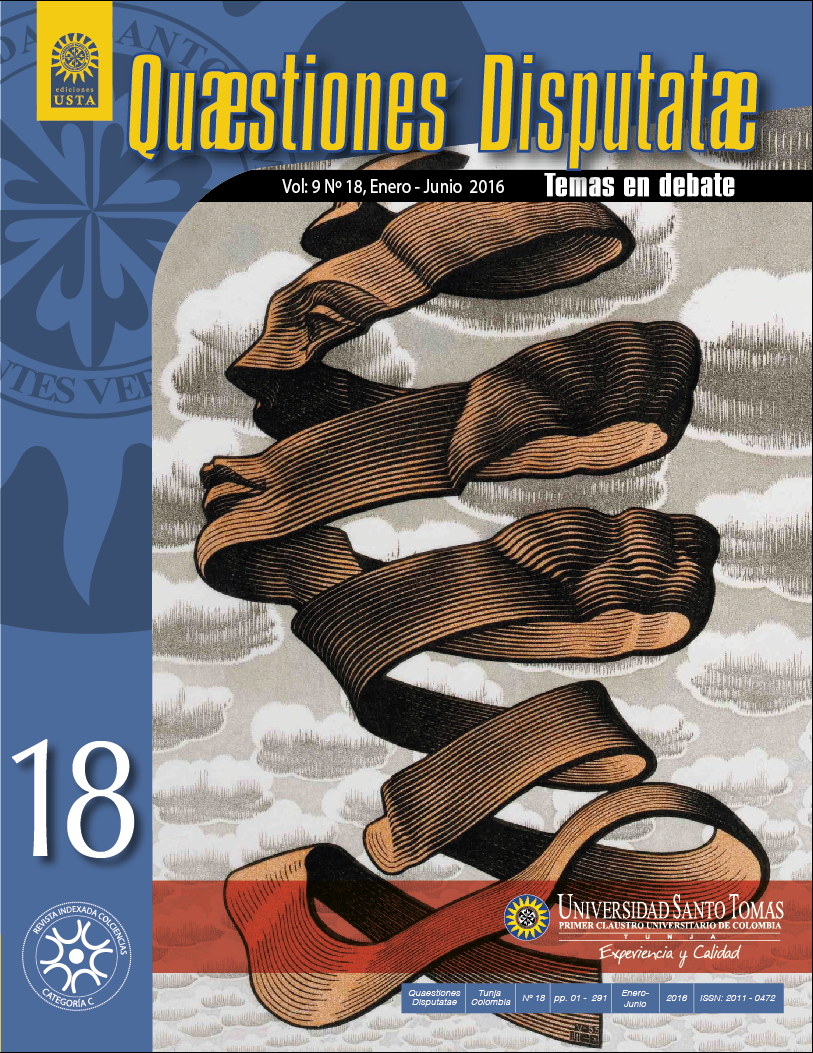The Concept of Legitimacy as a Substitute for Political Justice
Main Article Content
Abstract
This paper seeks to explore within Schmittian legal thought, receipt of the Aristotelian concept of political justice in his Thomist interpretation. To this end, the author establishes the interdependence of the concepts of legitimacy and obedience and compares the concept of obedience in the Thomist reception of Aristotle with the concept of obedience in Schmitt, who seeks to transcend legal positivism in his search for an effective legal system. Then, it develops the relationship between the concept of legitimacy proposed by the German philosopher and jurist and types of legitimacy in St. Thomas. Finally, it analyzes the respective link to the concept of legitimacy with the effectiveness of existing powers in the Constitution of the Republic of Weimar.
Article Details
How to Cite
Sereni, C. A. S. (2016). The Concept of Legitimacy as a Substitute for Political Justice. Quaestiones Disputatae: Temas En Debate, 9(18), 213-228. Retrieved from http://revistas.ustatunja.edu.co/index.php/qdisputatae/article/view/1052
Section
Artículos Núm. 18
De acuerdo a la Licencia Creative Commons Atribución-No Comercial-Sin Derivar 4.0 Internacional, se autoriza leer, descargar, copiar, distribuir, imprimir, buscar o enlazar los textos completos de estos artículos, siempre y cuando se conceda el crédito a los autores de los textos y a la Revista Quaestiones Disputatae: temas en debate, como fuente de publicación original. No se permite el uso comercial de copia o distribución de contenidos, así como tampoco la adaptación, derivación o transformación alguna de estos sin la autorización previa de los autores y de la dirección de Quaestiones Disputatae: temas en debate.

Esta obra está bajo una licencia de Creative Commons Reconocimiento-NoComercial-SinObraDerivada 4.0 Internacional.
References
Aristóteles. (1992a). Ethica Nicomachea. Oxford, England: L. Bywater.
________. (1992b). Política. Oxford, England: Ross.
Bertín, H. D. y Corbetta, J. C. (1997). La noción de legitimidad en el concepto de lo político de Carl Schmitt. Buenos Aires, Argentina: Struhart&Cía.
Brodocz, A. (2006). Die politische Theorie des Dezisionismus: Carl Schmitt. En Brodocz, A. y Schaal, G. S. (Ed.), Politische Theorien der Gegenwart, I (277-311). Opladen, Deutschland: Budrich.
Castaño, S. R. (2005). Notas sobre la noción de mando político en Aristóteles. ARSP (Archivo de Filosofía Jurídica y Social), 91(2). Stuttgart, Deutschland: Franz Steiner Verlag, pp. 256-265.
________. (2011). Interpretación del poder en Vitoria y Suárez. Pamplona, España: Universidad de Navarra.
Gómez, O. G. (1986). Excepción y normalidad en el pensamiento de Carl Schmitt. Madrid, España: Centro de Estudios Constitucionales.
Hobbes, T. (1994). Leviatán. México: Fondo de Cultura Económica.
Kérvégan, J. F. (2007). Hegel, Carl Schmitt. Lo político: entre especulación y positividad. Madrid, España: Escolar y Mayo.
Mehring, R. (2006). Carl Schmitt zur Einführung. Hamburg, Deutschland: Junius Verlag.
Negro, D. (2002). Gobierno y Estado. Madrid, España: Marcial Pons.
Schmitt, C. (1966). Teoría del partisano. Madrid, España: Instituto de Estudios Políticos.
_________. (1974). Der Nomos der Erde im Völkerrecht des Jus Publicum Europaeum. Berlin, Deutschland: Duncker & Humblot.
________. (1979). Die geistesgeschichtliche Lage des heutigen Parlamentarismus. Berlin, Deutschland: Duncker&Humblot.
________. (1981). Land und Meer. Eine weltgeschichtliche Betrachtung. Köln- Loevenich: Hohenheim Verlag GmbH.
________. (1988). Legalität und Legitimität. Berlin, Deutschland: Duncker&Humblot.
________. (1991). Völkerrechtliche Groβraumordnung mit Interventionsverbot für raumfremde Mächte: Ein Beitrag zum Reichsbegriff für Völkerrecht. Berlin, Deutschland: Duncker & Humblot.
_________. (1993). Verfassungslehre. Berlin, Deutschland: Duncker&Humblot.
_________. (1994). Die Diktatur. Von der Anfängen des modernen Souveränitätsgedankens bis zum proletarischen Klassenkampf. Berlin, Deutschland: Duncker&Humblot.
_________. (2004). Der Wert des Staates und die Bedeutung des Einzelnen. Berlin, Deutschland: Duncker&Humblot.
_________. (2008). Politische Theologie II: Die Legende von der Erledigung jeder Politischen Theologie. Berlin, Deutschland: Duncker&Humblot.
_________. (2009a). Politische Theologie. Vier Kapitel zur Lehre von der Souveränität. Berlin, Deutschland: Duncker&Humblot.
_________. (2009b). Der Begriff des Politischen: Text von 1932 mit einem Vorwort und drei Corollarien. Berlin, Deutschland: Duncker&Humblot.
Tomás de Aquino, santo. (1894). Summa Theologiae. Roma, Italia.
_________. (1980). In II Sententiarum. Milán, Italia: R. Busa.
________. (1992b). Política. Oxford, England: Ross.
Bertín, H. D. y Corbetta, J. C. (1997). La noción de legitimidad en el concepto de lo político de Carl Schmitt. Buenos Aires, Argentina: Struhart&Cía.
Brodocz, A. (2006). Die politische Theorie des Dezisionismus: Carl Schmitt. En Brodocz, A. y Schaal, G. S. (Ed.), Politische Theorien der Gegenwart, I (277-311). Opladen, Deutschland: Budrich.
Castaño, S. R. (2005). Notas sobre la noción de mando político en Aristóteles. ARSP (Archivo de Filosofía Jurídica y Social), 91(2). Stuttgart, Deutschland: Franz Steiner Verlag, pp. 256-265.
________. (2011). Interpretación del poder en Vitoria y Suárez. Pamplona, España: Universidad de Navarra.
Gómez, O. G. (1986). Excepción y normalidad en el pensamiento de Carl Schmitt. Madrid, España: Centro de Estudios Constitucionales.
Hobbes, T. (1994). Leviatán. México: Fondo de Cultura Económica.
Kérvégan, J. F. (2007). Hegel, Carl Schmitt. Lo político: entre especulación y positividad. Madrid, España: Escolar y Mayo.
Mehring, R. (2006). Carl Schmitt zur Einführung. Hamburg, Deutschland: Junius Verlag.
Negro, D. (2002). Gobierno y Estado. Madrid, España: Marcial Pons.
Schmitt, C. (1966). Teoría del partisano. Madrid, España: Instituto de Estudios Políticos.
_________. (1974). Der Nomos der Erde im Völkerrecht des Jus Publicum Europaeum. Berlin, Deutschland: Duncker & Humblot.
________. (1979). Die geistesgeschichtliche Lage des heutigen Parlamentarismus. Berlin, Deutschland: Duncker&Humblot.
________. (1981). Land und Meer. Eine weltgeschichtliche Betrachtung. Köln- Loevenich: Hohenheim Verlag GmbH.
________. (1988). Legalität und Legitimität. Berlin, Deutschland: Duncker&Humblot.
________. (1991). Völkerrechtliche Groβraumordnung mit Interventionsverbot für raumfremde Mächte: Ein Beitrag zum Reichsbegriff für Völkerrecht. Berlin, Deutschland: Duncker & Humblot.
_________. (1993). Verfassungslehre. Berlin, Deutschland: Duncker&Humblot.
_________. (1994). Die Diktatur. Von der Anfängen des modernen Souveränitätsgedankens bis zum proletarischen Klassenkampf. Berlin, Deutschland: Duncker&Humblot.
_________. (2004). Der Wert des Staates und die Bedeutung des Einzelnen. Berlin, Deutschland: Duncker&Humblot.
_________. (2008). Politische Theologie II: Die Legende von der Erledigung jeder Politischen Theologie. Berlin, Deutschland: Duncker&Humblot.
_________. (2009a). Politische Theologie. Vier Kapitel zur Lehre von der Souveränität. Berlin, Deutschland: Duncker&Humblot.
_________. (2009b). Der Begriff des Politischen: Text von 1932 mit einem Vorwort und drei Corollarien. Berlin, Deutschland: Duncker&Humblot.
Tomás de Aquino, santo. (1894). Summa Theologiae. Roma, Italia.
_________. (1980). In II Sententiarum. Milán, Italia: R. Busa.

